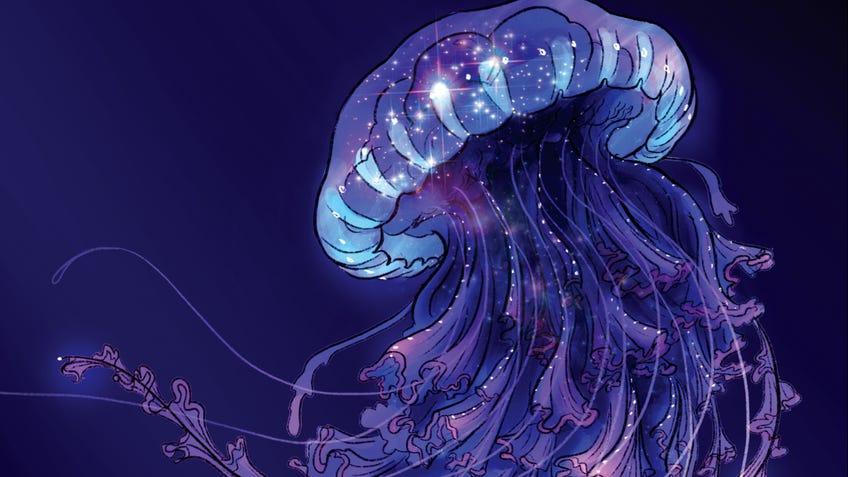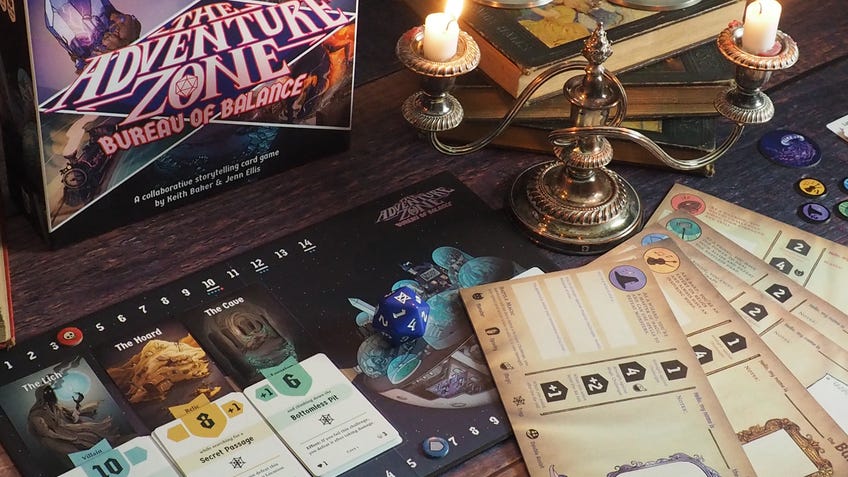Adventure Zone DM Griffin McElroy and Bureau of Balance co-designers chat about their new board game
And why there isn’t an Adventure Zone RPG yet.
The Adventure Zone: Bureau of Balance is the very first tabletop adaptation of the beloved Dungeons & Dragons actual play podcast that first began in 2014.
With Dungeon Master Griffin McElroy at the helm - with his brothers Justin and Travis, and his father Clint McElroy, taking the roles of the three main characters Taako, Merle and Magnus - the first season of The Adventure Zone created a world that took classic elements of D&D lore and transformed them into something entirely unique to the campaign. Now, on its fourth season - with Griffin taking the DM wheel once again - The Adventure Zone continues to be an immensely popular actual play series in a sea of contemporaries.
However, the appeal of the series’ first campaign is still undeniably apparent, as the Bureau of Balance takes its themes and ideas from season one’s The Balance Arc. To discuss the lasting appeal of The Adventure Zone’s first season and what makes it a good source of inspiration, we spoke with Griffin and the co-creators of the Bureau of Balance board game Jenn Ellis and Keith Baker, who also revealed why there isn’t a roleplaying game based on The Adventure Zone and what players can expect next from the tabletop series.
How did the idea for a Bureau of Balance board game first come about?
Jenn Ellis: For us at Twogether, there are many things we love about the Adventure Zone. The punch-up humor and the positive energy of the podcast has always appealed to us. We love the way that the Adventure Zone has opened doors to people who might not play a traditional roleplaying game, and also how the McElroy Family has always encouraged their fans to interpret the property in their own ways—that there is no one absolute right way to draw Taako for example. When our paths crossed with the McElroys, we asked them if they would ever consider working with us and we were overjoyed that the answer was “Yes!”. We pitched a few ideas and this game was the one they all liked the best.
We wanted something that evoke the chaotic good feel of the show itself, something that is driven more by the story than by the rules.
Griffin McElroy: We’d been kicking around the idea of doing some sort of board game/tabletop game based on TAZ for some time, but never really had that “bolt of lightning” moment where that idea became a thing we wanted to pour time and energy into. When we met with Keith and Jenn aboard the JoCo Cruise and started talking about working on BoB, we for sure had that moment, and after bouncing some ideas back and forth it was super obvious that this was something we’d adore working on with Twogether.
Why a board game and not an Adventure Zone RPG sourcebook or campaign book?
Keith Baker: From the very beginning we all agreed that the game wasn’t about replicating the events of the Balance Arc, it was about capturing the feeling of the Adventure Zone at your table and giving players the chance to create their own stories in that world. And at the end of the day, a typical D&D game doesn’t feel like The Adventure Zone. We didn’t want a game that was burdened by stacks of statistics and by rules the players themselves often ignore. We wanted something that evoke the chaotic good feel of the show itself, something that is driven more by the story than by the rules. And ultimately we wanted to make something that any fan of the Adventure Zone could sit down and play in 90 minutes, even if they’ve never played an RPG or where not 100% familiar with the podcast- and we wanted them to smile and laugh during those ninety minutes, and win or lose, to end up with a story they love.

The Adventure Zone: Bureau of Balance is a collaborative storytelling game, but it’s not trying to fill the same space as the big d20 games out there (despite the fact that it comes with a big d20!). It doesn’t require a DM or any preparation; it’s a game anyone can play on the spur of the moment. This isn’t something that’s going to replace your long-term D&D campaign, but it’s a great option to have when your DM is out of spoons and needs a break or to play with a friend who’s interested in roleplaying but isn’t quite ready for a traditional RPG.
How much freedom do players have in the game? Theoretically, how different could each group's stories be?
The game actively encourages players to tell stories, even though it doesn’t force them to.
Baker: The adventure decks used in Bureau of Balance are designed to serve as prompts rather than fully defined concepts, and its up to the players to add the details. Consider some of the Villains in the game—the Dragon, the Lich, the Dark Lord. These are broad, iconic concepts, and the first thing you do when you start the game is to add details. Yes, you’re fighting a Lich, but who is THIS Lich? Some groups may follow a serious path (“This lich is the Abactor Hekuul, the last survivor of the Fallen Empire, determined to reclaim his ancient glory”) while others may keep things light and simple (“This lich is Cheryl; she and my wizard were roommates in Magic School.”) This is also the reason the adventure cards are double-sided; you can definitely play the exact same combination of decks multiple times and experience completely different stories.
How does the Bureau of Balance build upon the storytelling mechanics found in the Gloom series?
Baker: Storytelling is my favorite part of playing Gloom. But the simple fact is that storytelling has no mechanical impact on Gloom. It’s something we encourage and that people like to do, but it’s not actually embedded into the game itself. With TAZ:BoB, we built on that by adding Story Bonuses. Many challenges pose a direct question to the player and offer a reward for answering that question with a story. When you’re dealing with the Great Gate, you could just trust your luck and roll the die. But the challenge has a Story Bonus: if you tell everyone exactly how you plan to get through that gate, you’ll get a +1 to your roll.
The thing about TAZ: Balance that makes it such a fun world to inhabit for a game like this is the lack of adherence to genre that characterized the whole campaign.
The key is that we never want anyone to feel like they are forced to tell a story. You don’t have to describe your cool plan for getting through the gate. But if you DO, it will be easier. So the game actively encourages players to tell stories, even though it doesn’t force them to.
Griffin, how much input did you and the rest of the Adventure Zone family have on the game?
McElroy: The core structure of BoB was all Keith and Jenn -- going through different decks of challenge cards to simulate a Relic retrieval mission, forming your own narrative along the way. We were super into the idea, and worked with Twogether to find opportunities to add whatever gameplay layers we could that would also incorporate more TAZ mainstays. The Fantasy Costco reward system was a good example of that, as it gave us a chance to toss a TON of TAZ items and gags into the game where they otherwise wouldn’t quite fit. We also had a lot of input on the challenge cards and their descriptions, which was definitely the part of the process most in our wheelhouse.

What makes the Bureau of Balance arc a great fit for a board game? The recognisable locales and characters? The potential for expanding the universe?
McElroy: Honestly, the thing about TAZ: Balance that makes it such a fun world to inhabit for a game like this is the lack of adherence to genre that characterized the whole campaign. Not only does that spice up the kinds of encounters you can include in a game like this, it gives the players permission to not lean so heavily on fantasy tropes when making up their own missions with their pals at home.
If I had a little spa I could climb into whenever I needed to, you would never see me in public again.
Ellis: I think from a storytelling game design perspective having a world where people feel comfortable imagining themselves in it is key. It was amazing to playtest during lockdown because I was so worried people were going to not feel up to it but it was the exact opposite- I ran daily games for a month because people were so excited to take a break from “earth prime” for a little bit.

Griffin, what tips would you give for a fledgling dungeon master wanting to run their own Campaign?
Honestly, once you’ve found a good group of folks you can feel comfortable GMing for, do a test run before committing to anything more long term or narratively ambitious. Give everyone a chance to get familiar with the rules and the concepts behind character creation, maybe play through a bit of a premade adventure to get your bearings, and if it’s not working, scrap it and start over! It really eases the pressure not only on yourself but your players, and will set you up for success in the long run.
Are there any more Adventure Zone tabletop titles on the way?
Ellis: For this game, we have an expansion in the works that we’ve put on hold printing for the moment due to the exorbitant price of sea freight that would likely cause the price to double for consumers. Hopefully at the beginning of next year.
If you could get any item from the Fantasy Costco in real life, what would it be?
Baker: Slippies of Haste! I would love to be able to write faster, and beyond that, they’re just so comfortable.
Ellis: Pocket Spa- I mean, it’s an extra dimensional spa day in your pocket!
McElroy: Jenn took mine! If I had a little spa I could climb into whenever I needed to, you would never see me in public again.




